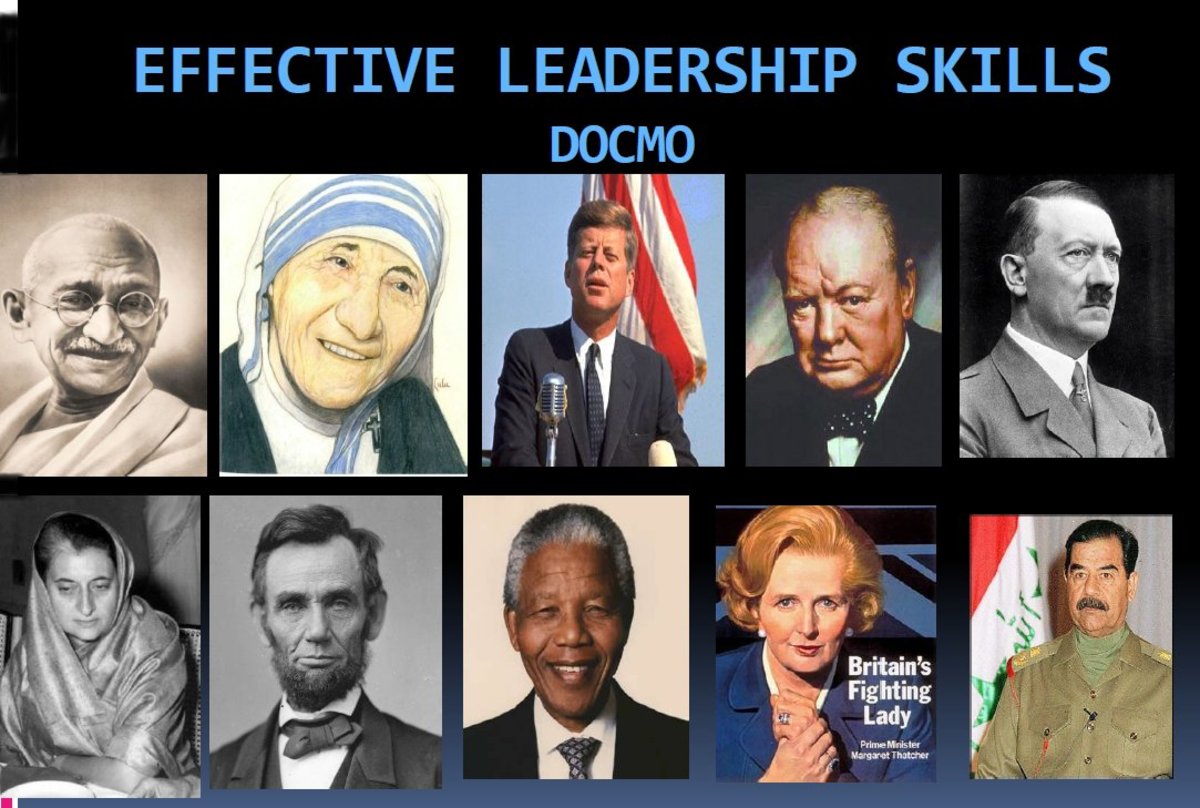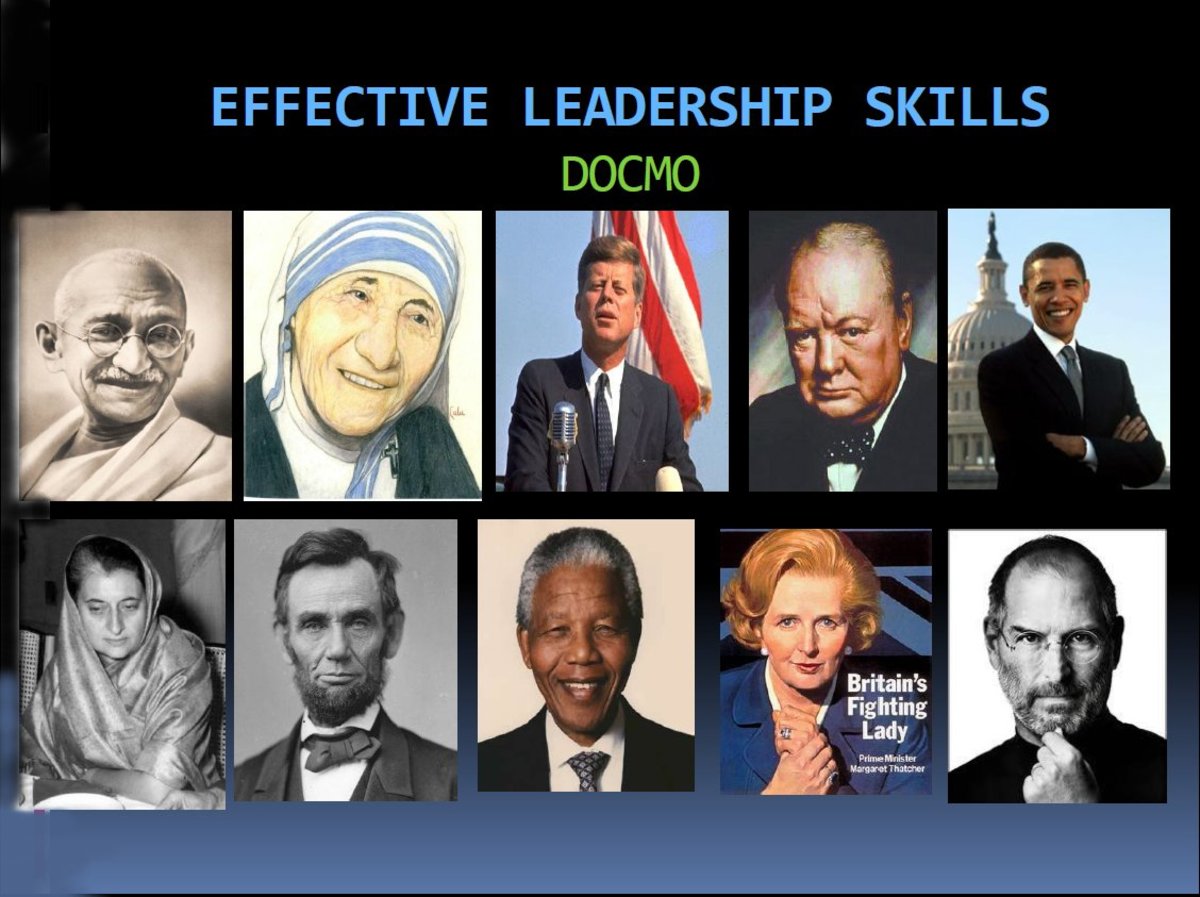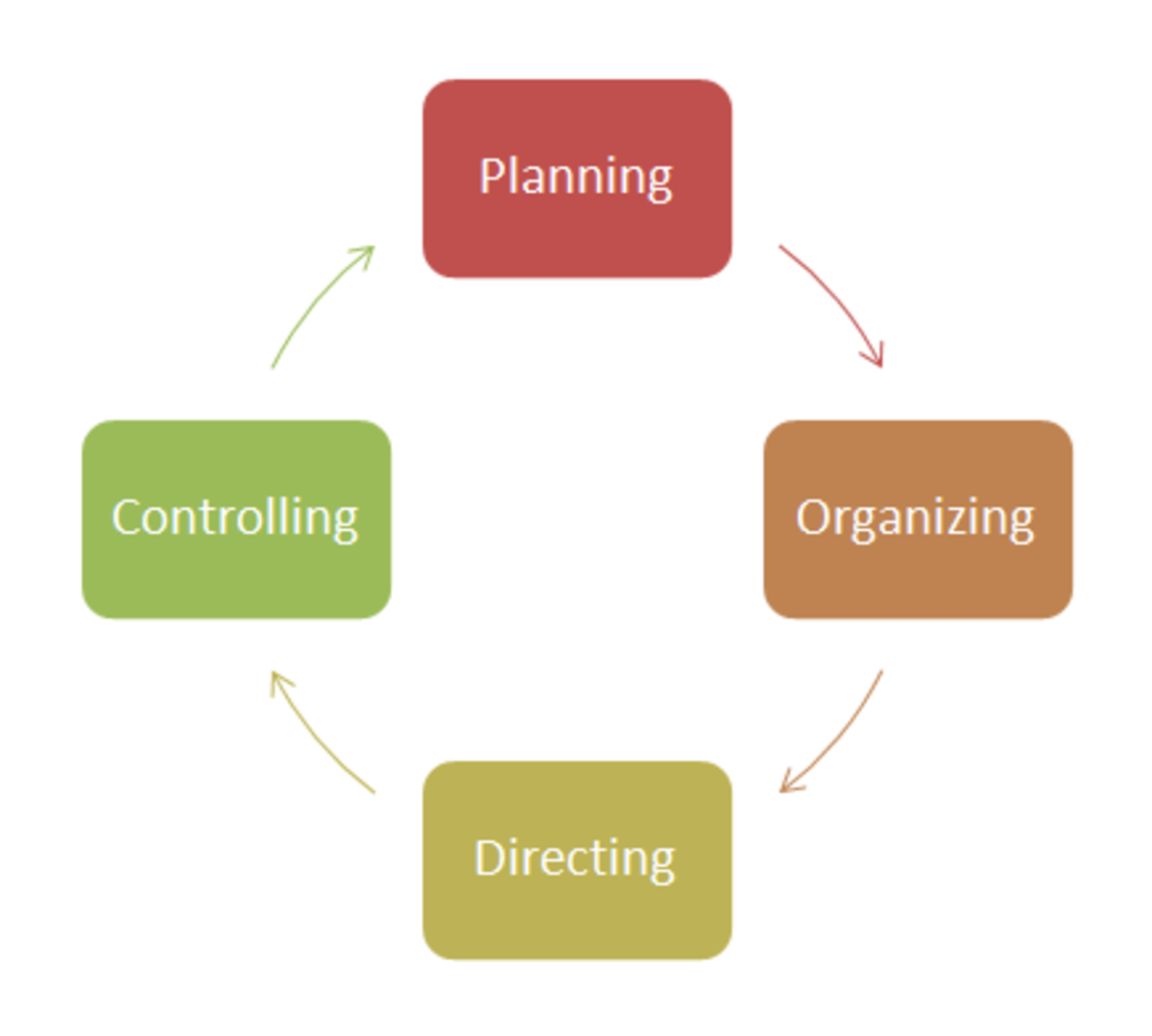Leadership 101

Lead . . . Me?
You are terrified to stand up in front of a crowd, but someone asked, and you hate to let them down. Or perhaps someone just asked to do a leadership task at work and your promotion is on the line.
Some people are natural leaders. There is something inside them that seems to push them out in front. They simply start walking, and when they look behind there are people following. It's partially in their DNA, and what's lacking there was probably instilled in them by their parents.
I'm guessing if you're really interested in reading this, you feel like you were best described in the first paragraph, but that's all right, because I'm convinced that anyone can be a leader if they really want to. It may take work. It will definitely require some change in the way one looks at things. But I believe it's possible. So, if you're hoping to be a leader, even of a small task or group, read on. And let me know how you're doing in your striving to be the best you can be.
Leaders Are Decision Makers - "I don't care" is not an acceptable Leadership answer!
If you've been asked to lead, one of the first things you'll need to get used to is being decisive. That's a really hard skill for a lot of people. Many folks don't even like to pick the restaurant when a group is going to dinner. But after all the opinions have been given, someone has to make the final decision.
Good natural leaders will usually hold their preference till last unless no one else makes a suggestion. Those who don't want to lead will say "I don't care" or not have an opinion almost 100% of the time. If you're the leader and you have a lot of followers who have opinions, it will be easy. Just use one of the suggestions or let the group come to a consensus. However, there will be times when you're leading a group with no opinions or worse still, a group that can't agree on one answer. In that instance, it will be up to you to choose. You'll probably worry about picking something that at least one person won't like. And you'll be correct. Being a leader isn't always easy. Chances are someone will complain about the final choice. Your job will be to make sure you didn't arrogantly or arbitrarily disregard other's suggestions, and if you didn't, then disregard the comments and complaints.
I think that's why leaders sometimes come across as arrogant. When you're making a leadership decision, you must often take the attitude that if the complainers aren't happy, they should have spoken up sooner. I know it seems harsh, however, if we dwell too long on those who are unhappy, we'll waver and won't make the decision or will make it too late. If no decisions are made, nothing gets done. The decision making process is an important first step in nearly every task or project.

Leaders Understand Their Role
In Other Words - Never forget that being a leader means SOMEONE is following!
The common saying among leaders is this:"You know you're a leader if you look back and someone is following you." And followers bring a whole new set of challenges for a leader. A leader has to constantly consider that there are people behind him for whom he is responsible.
It's much like leading your cousin to your house from the local restaurant the first time he comes to visit. When you're in the lead car, it's important that you look in your rear view mirror often to make sure the second car is keeping up. You have to keep an eye on the traffic lights to keep your guest from being caught and left behind. It's important that you take a route that will be easy for your cousin to follow the next time she visits, not necessarily the "short cut."
Likewise, your leadership position at your job, church or other organization will mean that you'll have to take others into consideration in all your planning as you move forward. Perhaps your first leadership role is merely being asked to read or lead the team in a group response. First of all, your "audience" MUST be able to hear you. If you aren't a natural leader, you should probably assume that you don't speak loud enough. I know it's a generalization, and one should usually avoid stereotyping, but the truth is those without natural leadership skills are most often soft spoken. Even if you are a good leader, it's imperative you project when speaking before a large group.
Additionally, if you're leading a spoken response, don't run ahead of your group. Speak a little slowly and plan your phrases. Be sure you're heard by everyone in the crowd. If you're using a microphone, check out this page I've created to help you know how to use a microphone. Listen to your group as you lead. It's your job to keep them all together. They can't hear each other, but they should all be able to hear you.That's a good description of a leader's role: to keep everyone together.
You'll need to keep a good balance between self-confidence and humility. Those who get "too full" of themselves quickly rise to their highest level of incompetency and become that manager dreaded by everyone. It's a difficult juggling act sometimes, leading while continually monitoring our style to be sure it hasn't made us arrogant or ungrateful, but it's probably the most important aspect of leadership. To be an effective leader, your focus will need to be on the task you have and the people you've been given to lead. You don't have time for the luxury of selfishness, including unrealistic self-esteem.
I'm sure it's easy to assume that those who have an inflated ego are selfish, but in truth, those with low self-esteem are really much the same. Low self-confidence also causes us to think too much about ourselves. We consider what others will think and dwell on our shortcomings. Any kind of inward focus is selfish whether it's unrealistically low or high.
A good leader delegates and listens well to help the group work efficiently to get something done. They focus on the task at hand rather than their own abilities or inabilities. With a little work and paying attention, you'll be able to understand your role as a leader. Don't give up! You can do it!
Books to help with Leadership


Leaders Have Self Confidence
But not arrogance
If you've been to my Knight in Shining Armor lens, then you may have read some of what you'll find below. If you haven't, you might want to drop by to contrast the things that I changed for this particular topic. But no matter which place you read, you'll discover that healthy self-esteem, self respect and self confidence are essential in leadership as well as life.
One of the first steps in becoming a true leader is believing you can be one. It's important for leaders to understand the truth of who they are. Leaders need to recognize their strengths as well as their limitations so they can have a healthy and balanced proportion of self confidence.
If you've been asked to lead, it will be important to see yourself as valuable and worthwhile without becoming conceited. Conceit can lead to abusive and self-serving behavior. And the bottom line is (as you may remember from the last chapter), leaders CAN NOT become self-serving and remain good, effective and productive leaders. The more you look around at leaders, you'll discover this can be a tricky balancing act.
Many leaders come across as arrogant simply because they know where they are going and how to get there. These are usually natural leaders. As children they've been taught to lead by their parents or been forced to lead by their peers. Often they won't mean to appear self centered or self serving, but as I said, it's a difficult road to travel. Followers expect their leaders to be confident. After all, following can be a scary endeavor too. A follower has to trust the one who is leading, and that can be nearly impossible if the leader doesn't believe in herself. Look for a moment at your confidence level. What is your lack of confidence keeping you from doing or causing you to do that makes you like yourself less? A lot of our fears stem from our low self confidence. You may want to make a list of things you wish you were doing, things you wish you could stop doing and things you are afraid to do. Sometimes just confronting the problems can be the first step in overcoming them. As you look at your list, stop and consider (or even write down) what is the worst thing that can happen if your fears come to fruition. How many of the things you wish you could do or wish you could stop doing stem from the things you are afraid to do? How many of your fears are really legitimate and how many are just stopping you from being the best leader you can possibly be?
Make another list of the qualities you have that might make you a leader. Include things you don't see, but others see in you. Ask those who follow you or those who have asked you to lead what they see in you. Then list the things that you see as keeping you from leading. It's healthy to put each of your short comings in perspective. None of us can do everything, and believe it or not, some parts of every leader's self-confidence stem from knowing her limitations. When we realize the things we can't do, we can avoid wasting time trying to do everything ourselves and find others to give some of our responsibility. As we delegate more and more and only leave ourselves tasks that we know we can accomplish with at least some level of competence, our self-confidence will increase. Which bring us to the next chapter . . .
Leaders Know How to Delegate
Natural leaders will have a much more difficult time with delegation than those who've had leadership thrust upon them. Many of us have learned over time to just complete every task ourselves. We've discovered that we can't always count on others to get the job done, so now we just do it. This leadership style assures us that everything is done properly, just the way we want it; however, it also guarantees eventual burn-out.
Let's face it, we aren't superhuman. We have to sleep, and we can only be in one place at a time. Delegation works much like that drop of water in the picture above. You, as the leader, when you delegate and develop other leaders, can reach much further than when you are working alone. The impact you can have by duplicating your efforts through others can be phenomonal. When you do it well, delegation will become one of the most important survival skills you'll ever learn.
Perhaps now you're remembering one of those horrific times you did delegate. You trusted someone else to complete a project for you, and it didn't get done. Or maybe it did get finished, but it was all wrong. That's a chance we take every time we delegate, but there are some precautionary measures we can take to minimize the damage.
First, don't throw a new "follower" into a job that is crucial. If you have an assignment that puts your "butt in the sling," don't give it to the newbie. No matter how competent they appear, this is a good time to either do it yourself or give it to one of your more seasoned volunteers. This was one of my biggest mistakes when I found myself as a new leader. I trusted people who seemed as though they were exceedingly qualified and ended up scrambling at the last minute to finish the job myself. Since then I've learned to give newbies what I call "entry level" assignments.
For instance, at our church absolutely ANYONE can sign up to be a greeter or usher. There's no screening, no preliminary requirements. It's a great way to find out if folks are able to follow directions and commit themselves to be present when needed without reminders. We'll often allow or ask those who look like they have the potential to lead, to assist another leader with a project. Not only does it give them an opportunity to show their willingness to get involved, it also helps you as the leader to see their skills, ability to follow directions and their level of humility.
Second, when someone comes up with a new idea, this is a great time to check out their leadership ability. Most often if it's something your group or workplace has never done before, it won't matter if it fails. So, unless it's an idea that just doesn't fit with your mission or vision, dump it in the visionary's lap. This person may not want to do the work. If so, there's a good chance he's not a leader. People who are all talk and no action do not make good leaders. They will drain your time and energy. I've encountered many who have a lot of great ideas, but they always expect someone else to do all the work. Don't waste much time trying to develop these folks. You'll be disappointed every time. On the other hand, those who take your affirmation and run with it are on their way to becoming some of your most effective future delegates. Even if the project doesn't come off as planned or fails miserably, this individual has all kinds of potential to lighten your load.
Once you've uncovered those hidden gems, be sure to treat them as such. Be aware of their family obligations and try not to put them in charge of too many tasks at one time. If they are leading any long term projects check with them on a regular basis to make sure they don't need anything and ask if they're willing to continue in the position. Send them notes or e-mails to affirm them and let them know they are appreciated.A really great leader understands that those he can trust to take on some of his load are his most valuable assets, and he puts that knowledge into action.
For those who are in paid positions, do your best to make sure your most valuable employees are adequately compensated. If you aren't willing to pay them what they're worth, someone else will. Finally, let go! Believe me, I know it's hard. But you won't last long if you don't develop a team of leaders to whom you can delegate some of your responsibility. Find and develop people you can trust to represent you in the jobs you need to get done. Then train the leaders under you to build teams of people who will become the next generation of leaders. Not only will you help your organization or company, you'll make yourself look good to those over you.
Leaders Pay Attention to Detail - Because the details are what separate mediocre from absolutely great!
I'm watching the Olympics as I write this. Apolo Ohno is phenomenal on the short track. He's a strong skater and exudes confidence. But the one thing I notice about him that I believe ensures his success is his attention to detail. He's always watching, always paying attention to every move his competitors make. He avoided more than one crash when others on the track fell in front of him, and he finds opportunities to pass that look impossible to the onlooker (and perhaps the other skaters). He has already won 7 medals because he pays attention to every detail.
A good carpenter puts wood together, but a master carpenter creates tight miters and smooth finishes. A good musician is pleasant to listen to, a great musician wants every note to be exact. A valuable proofreader understands the importance of every comma and space, and your favorite photographer will see the little things that will look like horns or a halo if your background is less than perfect.
If we want to be successful leaders, we, too, need to pay attention to the details. If you're in charge of the meal, it's more than just cooking the food. It means making sure all the food is done at the same time and everything needed for the meal is on the table so the guests can enjoy the food without scrambling for plates, cutlery and condiments. Or suppose you are in charge of keeping the building clean. Paying attention to the details means you notice things lying around, you see cobwebs before anyone else and you clean into the corners.
Paying attention to details might not be easy for you. Perhaps you're a bit laid back. That's actually a great quality in a leader. It's healthy for those following you to know that you aren't going to go nuts if everything isn't exactly right. But being laid back can't be an excuse for allowing the details to go by the wayside. When you're planning for an event, you need to take every detail into account. Whether it's planning for a party or coordinating a convention, there are details that need to be taken into consideration.If you need help, make lists and find people who are good at the details. Good leaders surround themselves with people who can make them look good (see that section on delegation above). And giving the details the attention they need and deserve will definitely make you look good!

Leader's Aren't Afraid to Share Their Opinion
and they can handle the truth
As a leader, you'll be asked to give your opinion on many occasions. As I said earlier, "I don't care" is not generally I good option for a leader. You may have to say you'd like to think about it for a bit if you truly aren't sure, but if you have an opinion, share it! Tell the world!! Even if no one else looks like they agree with your opinion, it's OK!!!The most important thing to remember is that an OPINION can never be wrong.
If some one asks you what time it is or how much an object cost, you could be mistaken; however, if someone asks what you THINK, you can never get that wrong. One of the hardest realizations for me to come to is this: "If you don't really want my opinion, then don't ask." I care a lot about what others think, so my natural inclination is to reserve my opinion until I'm sure that it's in line with what others are saying. However, that's not the way a leader works.
Please understand, this does not give us, as leaders, permission to share our opinion when it has not been solicited. Part of being a good leader is knowing when to keep your mouth shut. But the truth is the majority of those with the potential for leadership have a problem speaking up. We respect others (a great quality in a leader), and we are considerate of others' feelings (Yep, another great quality); however, these two factors will oft times keep us quiet, especially if our opinion is less popular.
If you've been asked to lead, there's a good chance those who asked you have confidence in your thoughts and ideas, so share them. Don't be embarrassed or intimidated if your opinion isn't embraced. Sometimes others will need to mull it over to come to see your point of view, and other times you'll be in the minority.There will be those occasions, when your opinion will just stink (it won't be wrong, but it may be misguided or off the wall). It's in those times you need to embrace the truth of the situation and understand that everyone has those days. Don't let it stop you the next time your opinion is called for. You are a leader and your opinion deserves to be heard!
Leaders Speak Well - Lead is a good four letter word
As a leader, it's important that you always speak respectfully and intelligently. Within just a few sentences, I can often tell if a person will rise to leadership or not. Leaders need to carefully choose the words they speak and avoid bad grammar and obscenities.
There is nothing less attractive than folks who feel the need to use foul language all the time. We've all heard them. There is an entire segment of the population who interject profanities as if they were "and" and "but." When I hear those kinds of conversations, it makes me wonder how intelligent the person really is. I wonder if it's truly possible that his vocabulary can be so limited that he can only express his distaste or disgust using words that offend me. When I hear educators, and others in careers that require Masters degrees or higher, use what some define as "colorful language", I am disturbed and astonished that they choose to abandon the gift of education they've been given for gutter talk. Perhaps they think it sounds "cool" and helps them blend in. However, in reality, it reduces any respect those following have. Even those who aren't offended by the language will feel as though this potential leader has no more right to lead than his friend down the street. Why should I follow someone who can't even speak as intelligently as I?
Now, don't get me wrong. I'm not suggesting that leaders speak over the heads of their listeners. That would be just as rude as assuming that an entire crowd wants to hear their flippant tongue. In fact, a true leader speaks with respect to each person, other leaders and followers alike. The good leader doesn't show off with big flowery words, but she certainly doesn't want to disrespect those who appreciate good grammar by using slang, "ghetto talk" or poor subject/verb agreement.Good leaders are also careful to avoid acronyms, "nicknames" and inside jokes when speaking to large groups. Anytime you're speaking to a group of 15 or more, please don't assume that everyone in the room knows what your alphabet stands for, unless of course your acronym has become as common a word as SCUBA. And those phrases that have become popular because of some inner office memo that went awry, those are off limits too. You are a leader. You are constantly aware of every person in the room, and you care whether or not they understand or feel alienated by something you might say.
Leaders Take Initiative
but are not TOO helpful
After you learn to pay attention to detail, the next step in becoming a really great leader will be taking some initiative when you see something that needs done. This can be a bit trickier than some might imagine, but if you put this leadership quality into practice AFTER you learn to pay attention to detail, you'll find it is not impossible.Leaders see what needs done and do it! (at least most of the time)
The tricky part about this is the reason it's so important for a leader. Leaders do see what needs done, but they may not always do it. There are those times when a leader may have to show restraint, especially if you are a natural leader. Prior to stepping up and taking care of that task you noticed needed some attention, you'll need to make sure no one else has been scheduled or asked to do it. It will be very frustrating to those who are making plans to accomplish the goal if they come to do it and find it's already been done by you. In addition, if the task is something that's been assigned to someone else, that person may have a completely different approach to completion, and your help may actually be a hindrance.
I know that for most of you the concept of being TOO helpful is very foreign, but it is a habit a lot of people seem to demonstrate. If you find yourself in someone's way, watching someone redo something you've already done or "taking care of" something for others often, ask an honest friend if you are too helpful. This faux pax will stand in the way of your rise to becoming a great leader.
On the other hand, a leader most often will need to take initiative. When you see something that needs done, you just may have to take care of it. Sometimes you'll do it yourself, and other times you'll delegate the job. In every instance this quality will require your ability to pay attention accompanied by enough confidence to step out and do what needs done. You can't do it for the attention or the recognition. Your only motive in taking initiative will be to see to it that the goals set before you are being accomplished. It's tough, but you're a leader, you can do it!
Leaders Never Stop Learning
A leader who thinks he knows it all is the most frustrating kind of individual I've ever had to work with. In fact, it's not only frustrating, it makes me (and most) not want to be a follower.
As a leader, we should continually be watching for things we can learn, either from those who are following us or by taking classes, reading books, attending seminars or researching things online. The ways to gain knowledge are pretty much limitless here in the 21st Century.
As leaders, we sometimes will get so busy we don't seem to have time to squeeze in that training or even surfing, but when we neglect our learning, we will grow stagnant. Actually, if you've read this far down the page, you probably have some potential! Most would-be leaders probably quit after the second or third section. They either didn't have time or read a few things they already knew.
After years of attending seminars, I often attend those where I don't really hear anything new; however, generally the experience will inspire me or rekindle an ember that I'd let go out. Nearly everything I write sends me surfing somewhere on the internet. Often it's just to verify what I'm typing is actually true, but even then I will find new information that increases my knowledge base.
Leaders who aren't willing to learn are short term leaders at best. You will eventually rise to your greatest level of competency and then, if you're lucky, you'll be shuffled from position to position until you get tired and quit. Whether you are trying to move into a management position at work or you've been thrust into a leadership role in a volunteer position, if you want to truly be the best you can be, you'll will intentionally find ways to know more every day.
Leadership Tips from Marvel Comics
- What Happened to Edward Norton
Leadership Strategy tips from the Avengers - This article was actually written by a ministry leader, but has some awesome insight into real leadership.
What Do You Think About Leadership
Easy or Difficult? What's your opinion of leadership
Leaders Show Respect
They Respect Themselves and Others
As a leader, it's vital that you learn to respect everyone, yourself and those who follow you. Unfortunately, respect is something few seem to understand in the 21st Century, so allow me to pen a few paragraphs that will give you some examples of respect.People who respect themselves, respect others. - So the first step in respecting others is respecting yourself. When you respect yourself, you won't put yourself down or downplay your actions. When someone gives you a compliment, you will simply say "Thank you" rather than brush off the kind words.
People who respect themselves respect others enough to allow them to thank them. In fact, not only do we allow another to thank us, we will always allow others to speak and to finish what they have to say BEFORE we interrupt. As a leader, don't be afraid to allow a few moments of silence between when the other person stops talking and you begin. Leaders do no correct others in public - Part of your responsibilities as a leader may entail evaluating the performance of others and making corrections to their techniques. Sometimes this may mean dealing with employees or volunteers who are completely incompetent to complete the task. Regardless of the magnitude of the mistake or how much the employee or volunteer needs instruction, it is important that you, as a leader, do not degrade the volunteer or employee in the presence of others, employees or customers. It is degrading, embarrassing and unfair to belittle someone (even your own children) in front of others. It's not that you shouldn't correct these folk, however, you may take them aside or into another room to explain their inappropriate behavior.
Good leaders respect others enough to allow them to maintain their dignity even when they need reprimanded. Leaders encourage and speak positively even when correction is necessary - As a leader, it's often necessary to tell someone they are wrong or need to act or behave differently; however, in the midst of this responsibility there's also an opportunity to show respect.
Prior to pointing out the faults or problem, take a moment and tell your employee or volunteer a couple of things that you respect about their ideas. Share something they recently have done correctly, and when you explain the problem, don't patronize or talk down to the person. Do not speak to the person as if they are children, treat them like an adult, even if they aren't 18 yet.
Leaders allow others to have opinions and respect their ideas - Your employees and volunteers can be the most valuable asset you have. Many of them will have excellent ideas, they'll have creative solutions and often an understanding of their work area even better than you, especially if you aren't a hands on manager or supervisor. Some leaders fear using ideas from underlings or if they do use these opinions, they don't appropriately credit them to the right person. A person of integrity will not only listen to ideas and opinions, they will integrate those that are valid and give the author credit. Respect of others is a vital part of being a leader.
When you respect those who are following you, you'll find that they are more productive and more loyal. For most people, your respect will cause them to do everything they can to continue to earn your respect. Work hard to respect and earn the respect of those who follow you. It will make you a wonderful leader.
How to Run a Meeting
Leaders often need to be in charge
Whether you've been elected chairperson or you are unofficially nominated to fill in for the guy whose usually in charge, it's important to have a basic idea of how a meeting should run. Before I get into specifics, I have a couple of basic suggestions. First, remember that as a leader, you should respect those who've come out for your meeting. I believe that respecting a person's time is one of the most important things you can do.
Be careful to begin on time. Consistently starting late is not only rude for those who are on time, it also trains folks to be late. Keeping respect of your committee members' time in mind, I also suggest that you, as leader, curb as many side discussions and off topic conversations as possible. Try to keep the meeting on track and keep it moving.
Preparing an agenda for your meeting will help you with your daunting task. For a meeting that needs run according to the strictest of guidelines, I recommend you familiarize yourself with Robert's rules of order. These are very extensive guidelines for running a meeting and are required for some more official business gatherings. Most of the organizations I belong to have a much more laid back form of government. We use some basics from Robert's Rules, but generally use the structure described in the next paragraph.
Because I generally serve on Christ based committees, we usually open with prayer and sometimes devotions then call the meeting to order. Next, the chair will ask for the minutes of the previous meeting to be read, corrected if needed, and approved. A report from the treasurer is normally the next order of business. Members may ask questions or note corrections if necessary. When everyone is satisfied with the Treasurer's report, it may then filed for audit. Some organizations I belong to have committee reports at this point. They then take a look at old business (anything that has been discussed at a previous meeting) followed by any new items that need to be brought before the committee. When a motion is made, the chair should make sure that the motion is complete (Is funding defined in the motion? Has the person or task force expected to complete the motion been defined?). If the motion needs more details, the chairperson could suggest a more complete motion or ask the person making the motion to make it more complete. The chair should ask for a second. if there is a second, discussion may follow. In our meetings, discussion often precedes the motion and more discussion may follow the motion. A motion may be amended if the discussion shows a need. If the person who made the original motion has no objections to the amendment, it can be deemed a friendly amendment. Otherwise, the committee will need to vote as to whether the motion should be amended. After sufficient discussion, the chair should ask for all in favor of the amendment to say, "aye," then all opposed to say, "nay." If the motion is approved, the motion is considered "carried."When all business has been concluded, the meeting can be adjourned.
If you're the chairperson of the group, you can help your members be efficient by having the secretary mail a copy of the minutes as soon as possible after the meeting. This gives the members an opportunity to carry out anything that was decided at the meeting. For optimum efficiency you can also send the members a copy of the agenda about a week before the meeting so they can begin to consider all of the items scheduled to be discussed.
As a leader, you have the ability to chair any committee you are a part of. Remember that respect of your committee members in every way will make you the best chair the committee has ever had!
Leaders Persevere and Persist
In Other Words - They are Committed
Stop back - I'll be uploading this chapter soon.Interested in seeing it now - E-mail me to encourage me to get it done sooner!

Leaders Understand the Definition of Success
I'm really trying to get this done . . . . Give me some feedback to spur me on!
Here's your chance to be a leader. Maybe it's your first opportunity, but I have confidence you can do it! It's true, leaders need to be able to communicate their opinion. If it's negative thoughts, the words might need to be chosen more carefully. We don't want to be rude or heartless, but we want everything we are involved in to be the best possible, so it needs to be honest. And as a leader, we have to understand that when someone disagrees with our opinion or critiques our work, it's not a personal jab. Being able to evaluate constructive criticism and the ability to work with others in brainstorming sessions are two of the most valuable tools you can have as a leader. So go ahead, try out those skills, give me a thumbs up, like this on Facebook or give it a tweet! Plus, just below, leave your two cents (or three, if you have more to say.)If you feel the need to be especially negative and don't want to leave it here where the world can see, feel free to send me an e-mail. I can take it!!!








